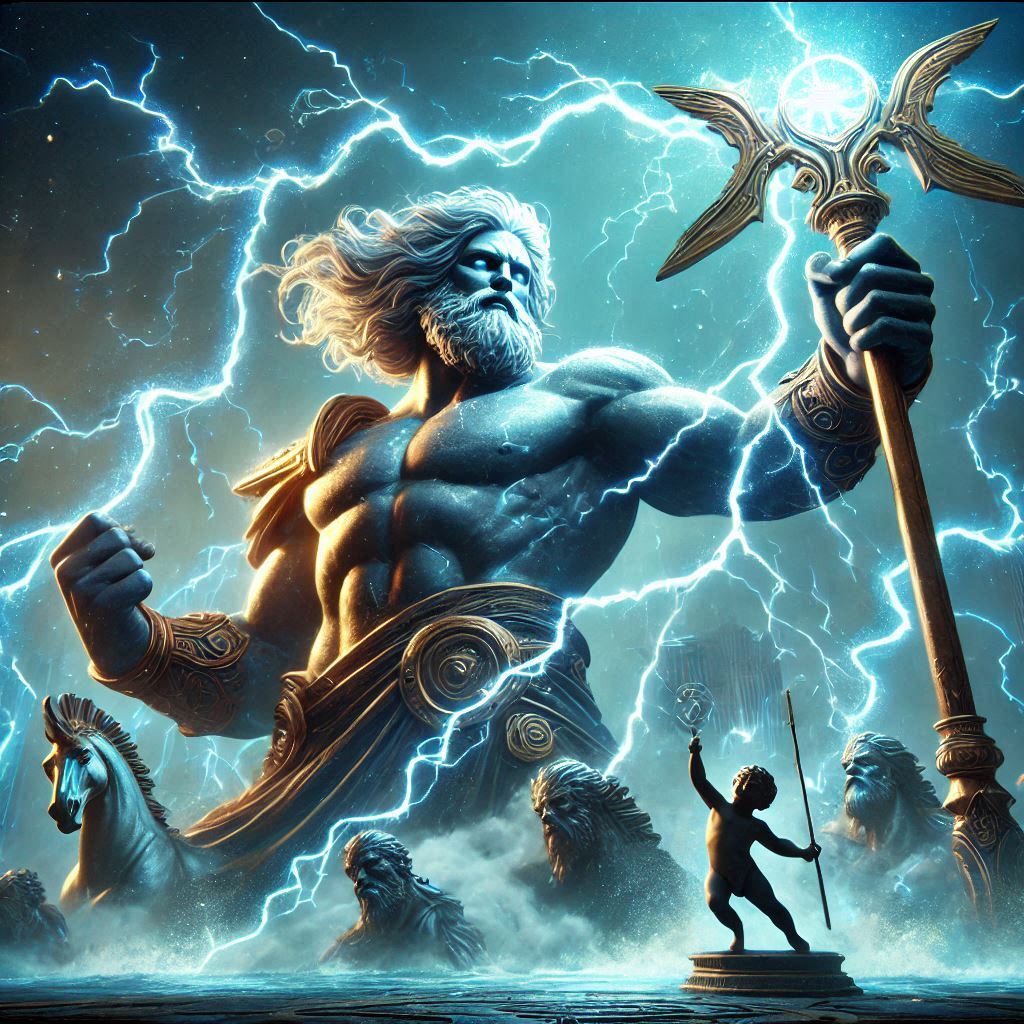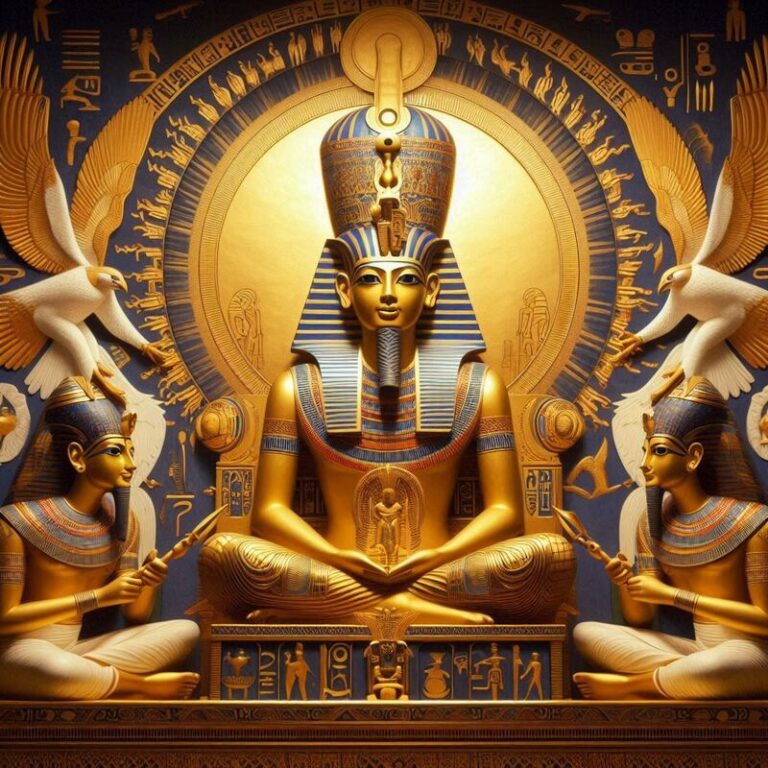Exploring the Myth of Zeus
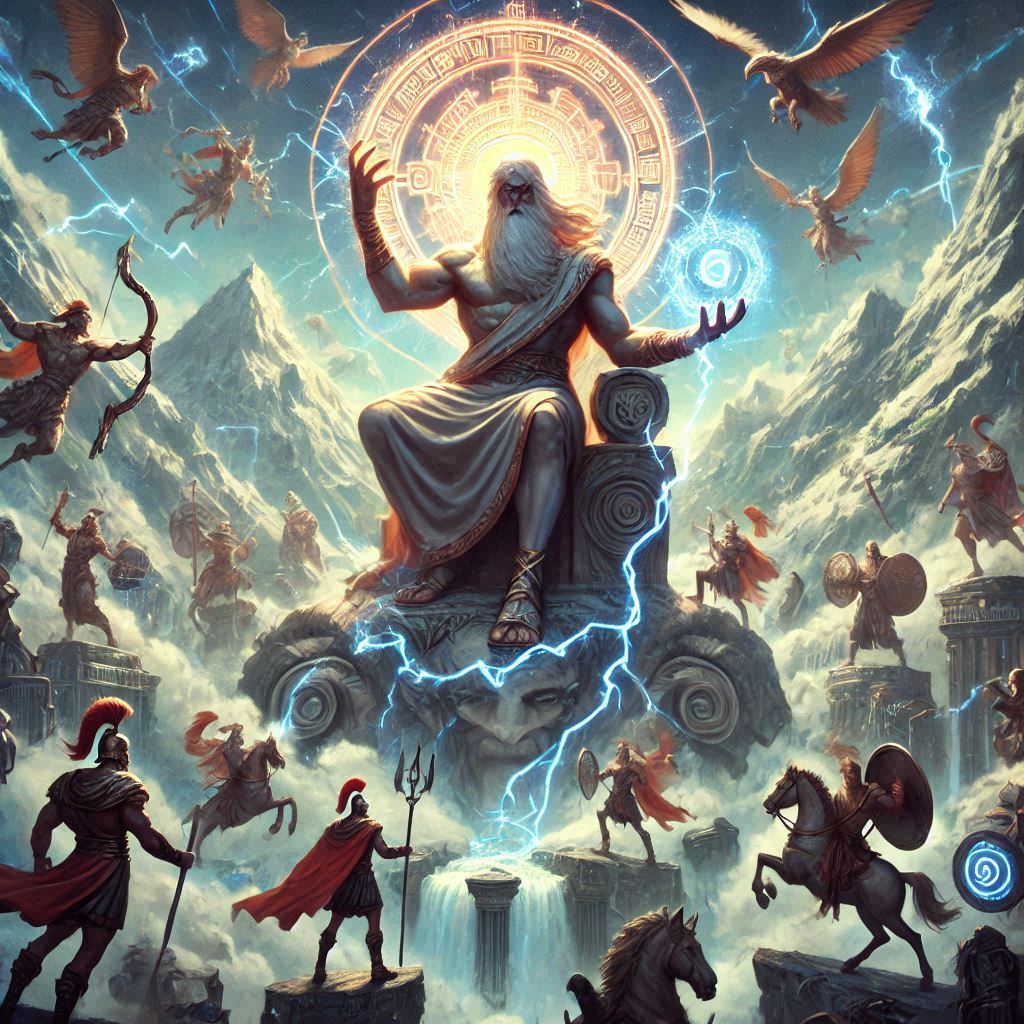
Exploring the Myth of Zeus
Zeus, the ruler of the Greek pantheon, is a figure whose presence dominates the mythological landscape. Known as the “Lightning King,” his tales are filled with power, passion, and the complexities of divine rule. Revered for his strength and feared for his temper, Zeus embodies the ideals and contradictions of a supreme deity. This article delves deep into the mythology surrounding Zeus, exploring his origins, powers, relationships, and legacy, while unraveling the enduring allure of the god who wielded thunder as both a weapon and a symbol of authority.
The Origins of Zeus: A Heroic Ascent to Power
Exploring the Myth of Zeus
Zeus’s journey to becoming the King of the Gods began with a tale of defiance and survival. He was the youngest child of Cronus and Rhea, two Titans who ruled the cosmos before the Olympians. According to Greek mythology, Cronus devoured each of his children at birth, fearing a prophecy that one of them would overthrow him. When Zeus was born, Rhea tricked Cronus by giving him a stone wrapped in cloth to swallow, while secretly hiding the infant on the island of Crete.
Raised in secrecy, Zeus grew strong under the care of nymphs and the goat Amalthea, whose milk nourished him. Upon reaching adulthood, Zeus returned to confront his father, leading a rebellion against Cronus and the Titans. With the help of his siblings—Hades, Poseidon, Hera, Demeter, and Hestia—and the Cyclopes, who forged his mighty thunderbolt, Zeus waged the Titanomachy, a cataclysmic war that lasted for ten years.
When the Titans were defeated, Zeus banished them to Tartarus, a deep abyss of the underworld, and divided the cosmos with his brothers. Zeus claimed the heavens and the skies, Poseidon took the seas, and Hades ruled the underworld. This victory marked the dawn of a new era, with Zeus crowned as the supreme ruler of gods and mortals.
The Power of the Lightning King
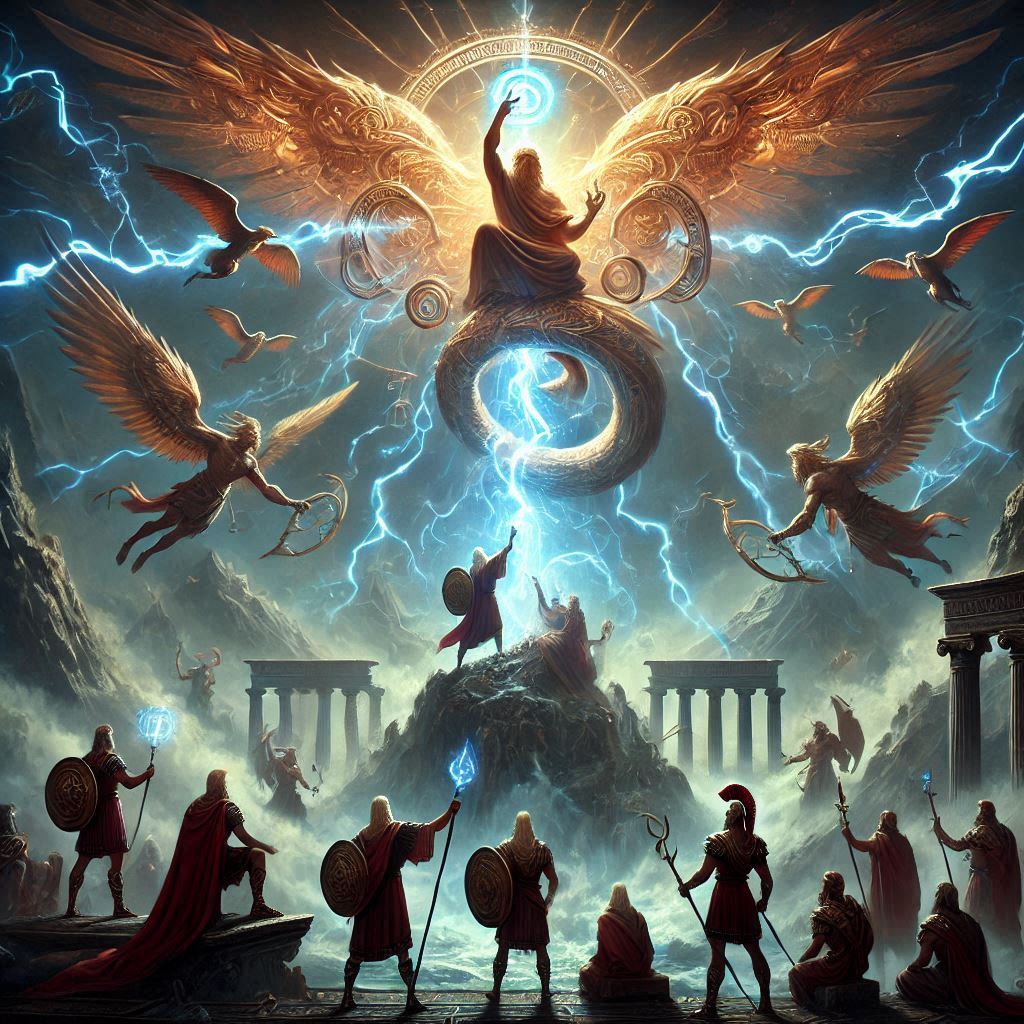
Zeus’s thunderbolt is his most defining symbol and weapon, gifted to him by the Cyclopes during the war against the Titans. With it, Zeus could unleash devastating storms and lightning strikes, signifying his unparalleled power. This control over weather, especially thunder and lightning, made him a god of immense awe and reverence.
Exploring the Myth of Zeus
However, Zeus’s powers extended beyond his mastery of the skies. As the chief deity, he was responsible for maintaining cosmic order and justice. Known as the protector of oaths and enforcer of laws, Zeus upheld xenia, the sacred code of hospitality, punishing those who violated it. In myths, Zeus often intervenes to protect the vulnerable or punish the wicked, serving as a divine arbitrator.
Despite his authoritative role, Zeus’s power was not absolute. He was bound by the will of the Fates, three primordial entities who controlled destiny. Even the King of the Gods had to respect their decrees, emphasizing that no one, not even Zeus, could escape the inevitability of fate.
Zeus’s Relationships: Passion and Turmoil
Zeus’s relationships are a central aspect of his mythology, reflecting both his divine authority and his human-like flaws. His consort, Hera, was also his sister, and their marriage represented the union of divine power and order. Yet, their relationship was fraught with conflict, largely due to Zeus’s infidelity.
Exploring the Myth of Zeus
Zeus’s numerous romantic escapades involved both goddesses and mortal women, resulting in a pantheon of offspring who played vital roles in Greek mythology. These unions often showcased Zeus’s ability to take on various forms to woo his lovers, from a swan to a golden shower.
Some of Zeus’s most famous children include:
- Athena, born fully grown and armored from Zeus’s head, embodying wisdom and strategy.
- Apollo and Artemis, twin gods of the sun and moon, born to the Titaness Leto.
- Hermes, the cunning messenger god, known for his speed and wit.
- Dionysus, the god of wine and ecstasy, born from Zeus and the mortal Semele.
- Heracles (Hercules), a demigod hero who became a symbol of strength and perseverance.
While his offspring enriched Greek mythology with their stories, Zeus’s affairs often led to conflict with Hera, who was known for her jealousy and wrath. This tension between Zeus and Hera became a recurring theme in many myths, highlighting the drama and imperfection of divine relationships.
Exploring the Myth of Zeus
Symbols and Worship of Zeus
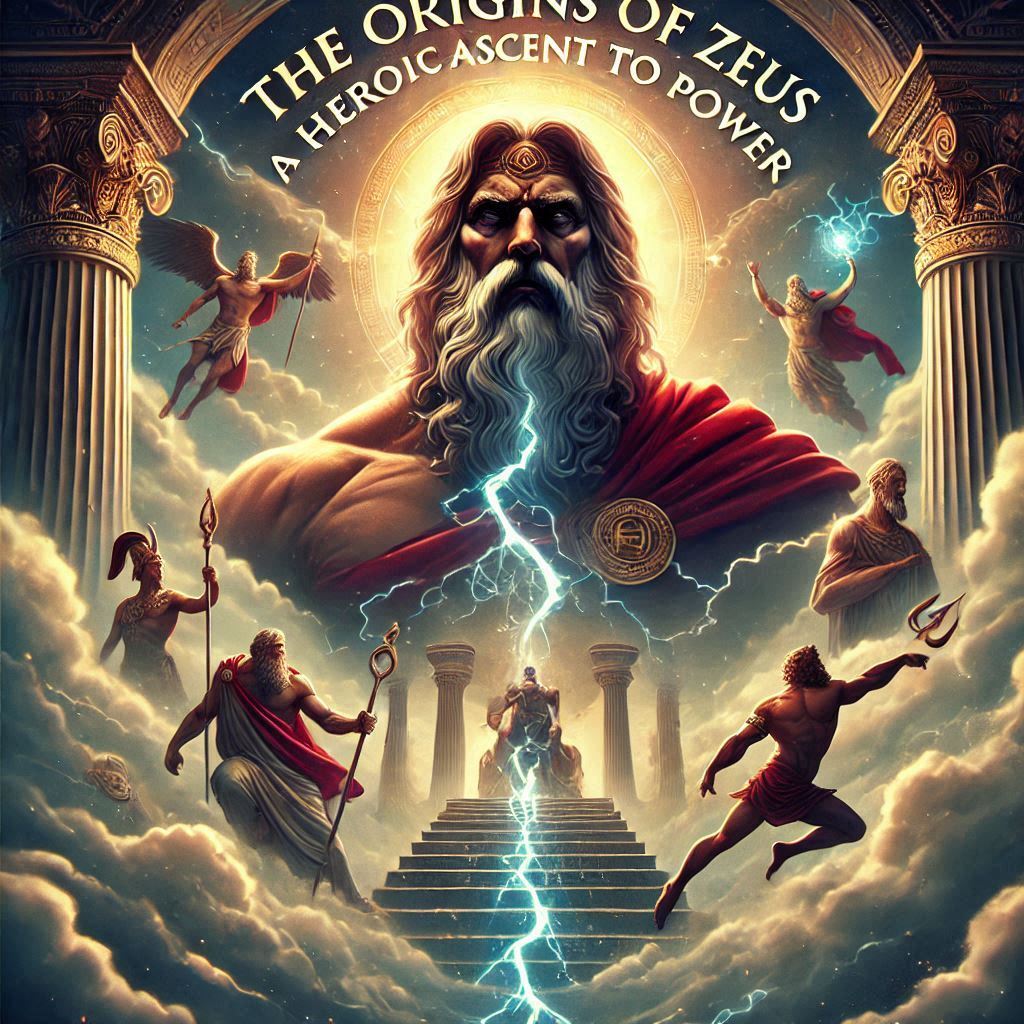
Zeus was venerated throughout ancient Greece as the supreme deity, with temples and rituals dedicated to him in various forms. The most famous of these was the Temple of Zeus at Olympia, which housed a massive statue of the god—a masterpiece by the sculptor Phidias and one of the Seven Wonders of the Ancient World.
The Olympic Games, held every four years, were originally established to honor Zeus. Athletes competed in various events to demonstrate physical excellence, a tribute to the god who embodied strength and majesty.
Zeus’s symbols, including the eagle, oak tree, and thunderbolt, became powerful emblems of his presence. The eagle, often depicted alongside Zeus, represented his dominion over the skies, while the oak tree symbolized strength and endurance. At the Oracle of Dodona, one of the oldest sanctuaries dedicated to Zeus, priests interpreted the rustling of oak leaves to convey his divine will.
Exploring the Myth of Zeus
Zeus in Mythology: Tales of Power and Morality
Zeus’s myths reflect the complexities of leadership, exploring themes of power, justice, and morality. While he is often portrayed as a wise and protective ruler, some myths depict a more vengeful or impulsive side to his character.
In the myth of Prometheus, Zeus punishes the Titan for stealing fire and giving it to humanity, chaining him to a rock where an eagle eats his liver daily. This tale reveals Zeus’s harsh enforcement of divine law but also underscores the tension between authority and rebellion. Exploring the Myth of Zeus
Another well-known story involves Zeus flooding the earth to cleanse it of wickedness, sparing only Deucalion and Pyrrha, who repopulate the world. This myth, reminiscent of global flood stories, highlights Zeus’s role as a just yet merciful deity.
Zeus’s Enduring Legacy
Zeus remains one of the most iconic figures in mythology, his image and stories transcending time and culture. From classical art and literature to modern media, he continues to inspire awe and fascination. Depictions of Zeus often emphasize his power, wisdom, and commanding presence, making him a symbol of authority and leadership.
Exploring the Myth of Zeus
In modern times, Zeus is frequently referenced in films, books, and video games, where his mythological legacy is reimagined and celebrated. His stories continue to serve as allegories for human struggles with power, morality, and the balance between justice and mercy.
Conclusion
Zeus, the Lightning King, is far more than a figure of myth—he is a symbol of divine authority, cosmic order, and the complexities of leadership. From his dramatic rise to power to his enduring legacy, Zeus’s tales capture the imagination, reflecting the values, fears, and aspirations of ancient Greece.
As the ruler of gods and mortals, Zeus embodies the eternal struggle between power and responsibility, justice and imperfection. His thunderous reign echoes through history, a reminder of the timeless allure of mythology and the enduring power of the gods.
